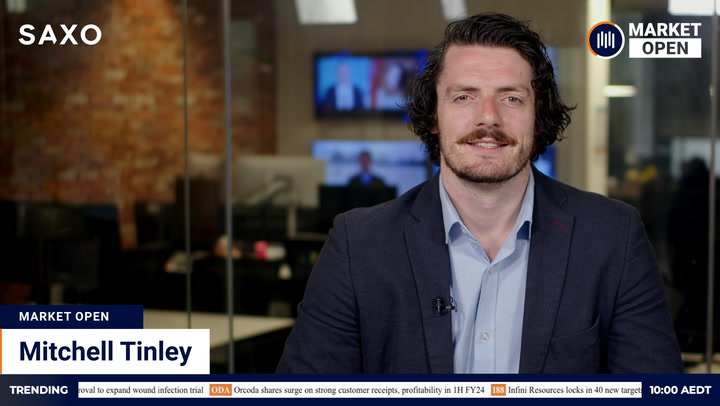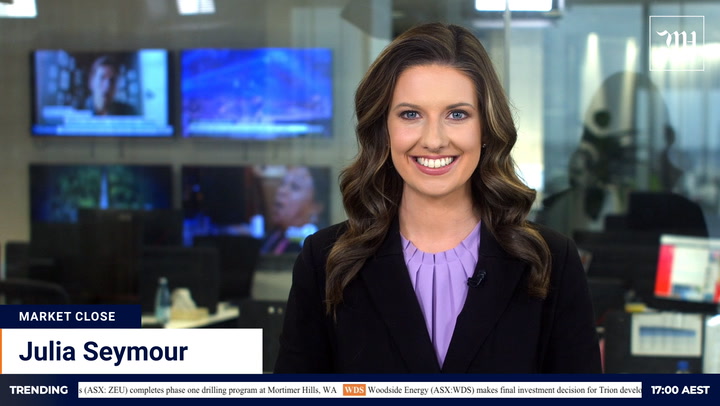Aussie shares sank to their lowest level since November 2020 as recession fears continued to batter financial markets.
The S&P/ASX 200 dived 136 points or 2.07 per cent towards a sixth straight loss. Barring a miraculous afternoon recovery, the benchmark was on track for its worst losing run since February 2020, the first month of the pandemic.
All 11 sectors sank after heavy selling on Wall Street. Gold miners provided most of the morning’s meagre gains.
What’s driving the market
The ASX 200 plunged towards its worst back-to-back weekly declines since the first month of the pandemic. Last week’s 4.2 per cent decline was the heaviest since April 2020. With the index down almost 7 per cent at today’s halfway mark, this week threatens to be significantly worse.
“Shares of all the big four banks fell, along with miners. ASX-listed miners plummeted as iron ore prices continued to slide amid a weak economic backdrop in China and the Covid-19 outbreak in key Chinese cities, which has clouded the demand outlook,” the chief executive of Kalkine Group, Kunal Sawhney, said.
“While rising interest rates in the US, the UK and Switzerland stoked recession worries, Australia’s strong labour market data published yesterday could pave the way for another 50 basis points rate hike in July. Concerns around another rate hike have triggered a sell-off in Australian equities.”
Wednesday night’s US rate-hike relief rally proved as fleeting as a burst of sun in a long, hard winter. Selling resumed with a vengeance overnight as grim economic data suggested the American economy was already losing heat.
The S&P 500 plunged 3.25 per cent, erasing Wednesday’s gains and quite a bit more. The broadest of the major indices ended the session down 6 per cent for the week. The index was on track for its worst weekly return since March 2020.
The aristocrats of the Dow sank 2.42 per cent. The blue-chip average closed below 30,000 for the first time since January 2021.
The Nasdaq gave up 4.08 per cent. The tech index has lost more than a third of its value since last year’s peak.
Selling has accelerated this week amid doubts about central banks’ ability to massage inflation lower without tipping the global economy into recession.
“The Fed has a serious reputation problem now,” Naeem Aslam, chief market analyst at AVATrade, said. “Firstly, they called inflation a transitory matter, and they allowed it to run hot and failed to scale back on their dovish monetary policy in a timely manner.
“Now, they are desperate to put a leash on inflation at every cost, and traders are nervous that their desperation to bring inflation lower could lead them to make another policy mistake. For instance, if you look at their latest guidance, they revised their expectations for inflation and unemployment and dialed down their growth forecast, which is a perfect recipe for a recession to take place.”
Going up
Gold has disappointed many during the market downturn as investors favoured the perceived security of the US dollar over precious metals. The industry finally outperformed this session as a retreat in the greenback lowered prices for buyers using other currencies.
Gold miners filled most of the slots at the top of the index. Evolution Mining gained 4.57 per cent, St Barbara 3.95 per cent and Silver Lake Resources 3.76 per cent. Ramelius Resources gained 3.73 per cent. Also strong were Zip Co +5.94 per cent and Telix Pharmaceuticals +3.59 per cent.
Gold heavyweight Newcrest was the only one of the market’s 20 largest companies to advance, rising 2.3 per cent.
Bubs Australia, one of the big winners from an infant formula shortage in the US, rallied 5.79 per cent after upgrading market guidance. The dairy company now expects full-year underlying earnings to be at least double previous guidance of $1.2 million.
The news helped lift rival A2 Milk 3.49 per cent. Australian Dairy Group eased 4.29 per cent.
Going down
Rate-sensitive tech stocks continued to lead the selling. At today’s low, the sector came within 1 per cent of losing half its value since last August.
Afterpay parent Block dropped 7.5 per cent. Xero shed 5.73 per cent.
Miners retreated as concerns about China’s zero-Covid policy depressed commodity prices. South32 slid 5.2 per cent, Champion Iron 5.54 per cent and OZ Minerals 5.02 per cent.
At the heavyweight end of the market, Rio Tinto declined 4.08 per cent, Macquarie Group 3.6 per cent and Fortescue Metals 3.36 per cent. The big four banks gave up between 0.6 and 2.6 per cent.
Mortgage broker Genworth tumbled 7.32 per cent. Link Administration eased 0.9 per cent despite reaffirming full-year guidance.
A profit downgrade smashed GUD Holdings down 20.29 per cent. The car parts supplier said service to new vehicles slowed significantly since April. The firm now expects full-year underlying earnings of $147 million, down from previous guidance of $155-$160 million.
Humm Group sank 16.52 per cent after plans to sell its consumer business to Latitude Financial fell through. The companies mutually agreed to terminate negotiations, citing “the current major disruption in financial markets”. Latitude shares were flat.
Today’s prices made grim reading for investors in some of the pandemic’s biggest winners. Shares in food delivery service Marley Spoon that traded as high as $3.80 in 2020 fell 13.33 per cent this morning to 19.5 cents.
Shares in online furniture retailer Temple & Webster were 78 per cent below last year’s $15 peak at $3.21. Stock in crowdsourcing marketplace Freelancer that traded at $1.38 a year ago was on offer today at 24 cents.
Other markets
Chinese stocks continued to ignore pressure on other markets. The Shanghai Composite advanced 0.26 per cent. Hong Kong’s Hang Seng added 0.71 per cent.
The Asia Dow shed 1.52 per cent. In Japan, the Nikkei 225 index dropped 2.25 per cent.
US futures rebounded. S&P 500 futures climbed 18 points or 0.48 per cent.
Oil unwound almost half of last night’s bounce. Brent crude declined 55 US cents or 0.46 per cent to US$119.26 a barrel.
Gold also pared its advance, easing US$2.70 or 0.15 per cent to US$1,847.20 an ounce.
The dollar retreated 0.18 per cent to 70.28 US cents.





